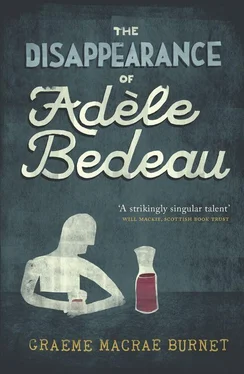‘Certainly,’ said Manfred.
‘Now, this occasion calls for a drink, don’t you think?’ And despite the fact that it was not yet nine o’clock the bank manager reached for a decanter on the table between them. He poured out two generous measures and toasted to a long and fruitful relationship. Manfred sipped his drink, feeling that he was being initiated into an archaic society of sherry drinkers.
‘It’s important to cement relationships,’ Jeantet went on. ‘That’s something you’ll learn. I’ve got much to teach you — running a bank isn’t about money, no, not at all. It’s about people.’ He paused and gave Manfred a meaningful look to underline the point.
Then quite suddenly, as if a cloud had crossed his face, Jeantet put down his glass and sat back in his armchair, clasping his hands across his belly. Manfred too put down his glass.
‘Now,’ he said in an altogether more sombre tone, ‘your grandfather — a fine man — has told me that you have failed your baccalauréat . That is not something to be applauded and normally I would not consider taking on a member of staff whom I did not consider to be up to scratch in the old brain department.’ Here he tapped the side of his forehead. ‘However, your grandfather has assured me that you are a bright young man and I am prepared to take him at his word. I trust you will repay the faith I am showing in you.’
He nodded seriously and then, to indicate that he had said his piece, once again took up his glass.
‘Academic qualifications are all very well, but what matters in life are hard work and a keen eye for human behaviour. I myself am an avid observer of the human animal. I’m not going to lie, you’ve landed on your feet with me. Observe and learn, and you’ll go far.’
He leaned in over the table and indicated that Manfred should do the same, before continuing in a stage whisper. ‘Between you and me, I plan to retire in a few years. Those mangy old bags out there,’ he jabbed his thumb towards the door, ‘haven’t got two brain cells between them. That’s monkey work out there. All they’re interested in is gossiping and picking up their pay cheque at the end of the month. But a bright young man in a good suit like yourself, if you play your cards right, you could be sitting in my place in just a few years. Now, what do you think of that, my boy?’
Manfred resisted the temptation to tell him that he would rather throw himself into the Rhine than spend one minute more than necessary working in the Saint-Louis branch of Société Générale.
‘I’m very grateful for the opportunity,’ he said.
That same day Manfred made inquiries about the apartment above the Restaurant de la Cloche, but it was occupied by the new proprietor and his wife. He then, as a temporary measure, took the apartment off Rue de Mulhouse.
THURSDAY WAS MARKET DAY. At half past twelve the Restaurant de la Cloche was thronging with people. Manfred recognised most of the customers and acknowledged those who spotted him with a nod or a silently mouthed ‘good day’. That was the extent of his interaction with his fellow regulars. Among those who lunched daily at La Cloche, there was, like railway commuters, a tacit understanding of the boundaries of communication. Manfred took his place at the table in the corner that Marie had reserved for him. The menu rotated on a weekly basis and offered a choice of two starters, two main courses and a special followed by dessert or coffee. In almost twenty years the daily menus had never varied. Thursday’s special was pot-au-feu. Approximately once a month, Manfred made a joke to Pasteur about changing the menu. ‘Do you see a suggestion box around here?’ the proprietor invariably responded.
Adèle appeared at Manfred’s table to take his order. He felt inexplicably excited to see her.
‘Hello, Adèle.’ He said attempted to make eye contact with her, seeking some acknowledgement of what had passed between them the previous night.
‘Monsieur,’ Adèle replied blankly. She did not raise her eyes from her notebook and she recited his Thursday order (onion soup, pot-au-feu, crème brulée ) before he had the chance to say anything else. Manfred was tempted to suddenly change his order just to get her attention, but as she turned away with an air of great ennui, he was glad he hadn’t. Such an act would only bring Pasteur to the table demanding to know what had brought about such a change of heart. Manfred imagined himself shouting, ‘I just felt like a change!’ before throwing over his table and storming out of the restaurant, batting other customers’ glasses of wine against the walls as he went.
He opened his copy of L’Alsace to the financial pages and gazed blankly at the columns of share prices. Adèle returned with his soup. She continued to betray no sign of the intimacy that had passed between them. Perhaps when she returned with his main course, he should casually enquire whether she had had a pleasant evening. He could even ask about the young man. What could be wrong with that? He had seen them together after all. Wasn’t it perfectly natural to acknowledge the fact? Manfred had already finished the glass of wine that was included in the set menu. The soup was watery and under-seasoned.
Customers arrived and left continually. When it was busy, the Restaurant de la Cloche ran like a well-oiled machine. Marie often paused at a regular’s table to exchange a few words, but her eyes were continually scanning the room for empty plates and customers wishing to pay their bills. These were despatched with a minimum of fuss by Pasteur from his station behind the counter. Tables were cleared and reset with military efficiency. There was a constant clatter from the kitchen and the calling of orders as they were delivered to the hatch. Customers spoke in loud voices with their mouths full, conscious that they were not expected to linger over their lunch. Most elected not to have coffee. If they did, it was brought with their dessert. Adèle attended to the other customers with the same sullen demeanour she displayed towards Manfred. She moved slowly and heavily like a cow on its way to milking, but, in her way, she was every bit as efficient as the bustling Marie.
Adèle collected his soup bowl on her way past, balancing the plates from another table on one arm. This was hardly the time to engage her in small talk. But as she turned away, Manfred spoke up. ‘Actually, Adèle, if it’s not too much trouble, I’d like to change my order. I’ll have the choucroute garnie.’
This would get her attention! Adèle turned back and said, ‘Certainly, monsieur.’ Her face remained blank. Manfred had to admire her nonchalance as she turned towards the kitchen.
‘And, Adèle,’ he said, raising his voice a little to make himself heard above the din, ‘Another glass of wine.’
He had to hand it to her, she displayed not a flicker of emotion, but as he watched her push through the swing doors to the kitchen, he could imagine the commotion as she announced that Manfred Baumann had changed his order. And he was having a second glass of wine! He sat back in his chair and surveyed the other patrons of the restaurant. They were oblivious to the momentous events taking place.
Manfred awaited the proprietor’s arrival at his table to enquire if the pot-au-feu was no longer to his liking. But Pasteur did not come over. He remained behind the bar decanting wine into carafes, acting as if nothing unusual had occurred. He did not so much as glance in Manfred’s direction.
Adèle arrived with his choucroute. ‘Bon appétit, ’ she said.
The pork was fatty and overcooked. The choucroute too sharp. He missed the braised meats of which Marie was so proud. The pot-au-feu was Manfred’s favourite dish of the week, but that was not the point. He cleaned his plate. He would look very foolish if, having changed his order, he did not appear to have enjoyed his selection. He drained his second glass of wine and sat back with a feeling of great satisfaction.
Читать дальше












